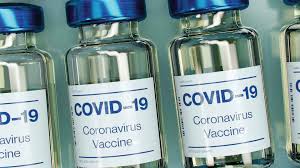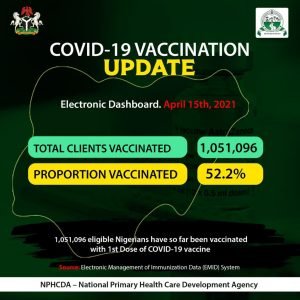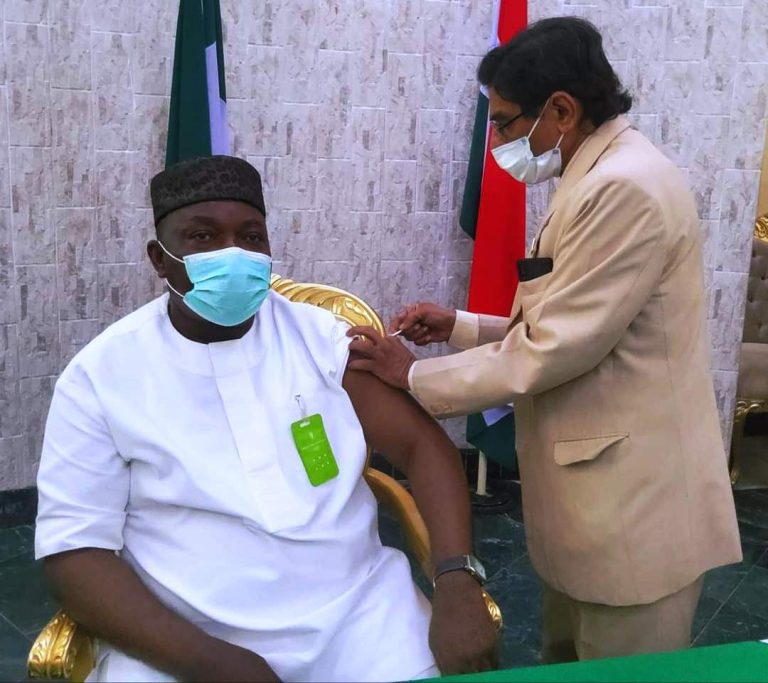Health
No fewer than 1.13m AstraZeneca shots administered – NPHCDA
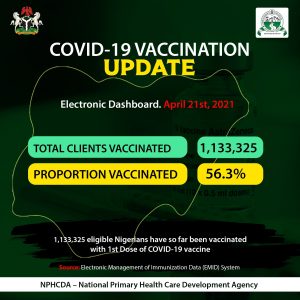
No fewer than 1.13 million shots of AstraZeneca COVID-19 vaccines have been administered across the 36 States of the Federation and the FCT.
The National Primary Health Care Development Agency (NPHCDA) made this known on its official Twitter handle on Wednesday.
“As of April 21, 1, 133, 325 representing 56.3 per cent of the eligible persons targeted with the AstraZeneca vaccine have been administered with their first dose in this vaccination phase,” it said.
The agency said that Lagos state topped the list by 218, 174 shots while Kano, administered 59,040.
It is followed by Kaduna – 58, 026 , Ogun – 53,314 and the FCT 52,348 .
The NPHCDA said those who have received their first shot, include health workers, frontline workers including; security agents, ports of entry staff, judiciary, petrol station workers, contingency workers and strategic leaders.
It noted that some of the states went a step further to vaccinate willing pensioners, people aged 70 and above, teachers and journalists during the same period.
The agency said that Lagos state was the only state that inoculated more than 200,000 residents during this first phase of vaccination in the country.
The NPHCDA stated that states with lower inoculation are Bayelsa with 10, 751, Ebonyi – 9567 and Taraba- 9,334.
It added that the Federal Government has directed states not to exceed the 50 per cent utilisation of the vaccines, to allow for a second dose to those who have taken their first.
“The remaining 50 per cent reserved at the agency’s cold chain store will be administered eight to 12 weeks from the date of the first doses.
“We have been careful to ensure that only those who are eligible to receive the COVID-19 vaccine in the current phase are being vaccinated,” it said.
Meanwhile, the agency advised Nigerians to check their vaccination cards for their next appointment dates and where possible to try to go to the same health facilities where they got their initial dose for their second dose.
It added that people who have received the first dose should not pre-register before going to the health facility for the second dose because they have already been capture.
Our correspondent report that Nigeria began COVID-19 vaccination on March 5 after receiving 3.94 million doses of the Oxford-AstraZeneca vaccine through COVAX, a UN-backed effort that promises access to free vaccines for up to 20 per cent of participating countries’ population.
The country has received another 300,000 doses of the Astrazeneca vaccine from telecom giant, MTN and 100,000 doses of Covishield COVID-19 vaccines from the India government.
Meanwhile, the Federal Government said the global scarcity of COVID-19 vaccines may delay the administration of the second dose.
It said :’there is a global scarcity of COVID-19 vaccines due to high demand, especially in countries where they are being produced.
“For this reason, we anticipate a delay in vaccine supply to Nigeria,” it said.
Health
KWSG flags off measle-rubella, polio vaccination campaign
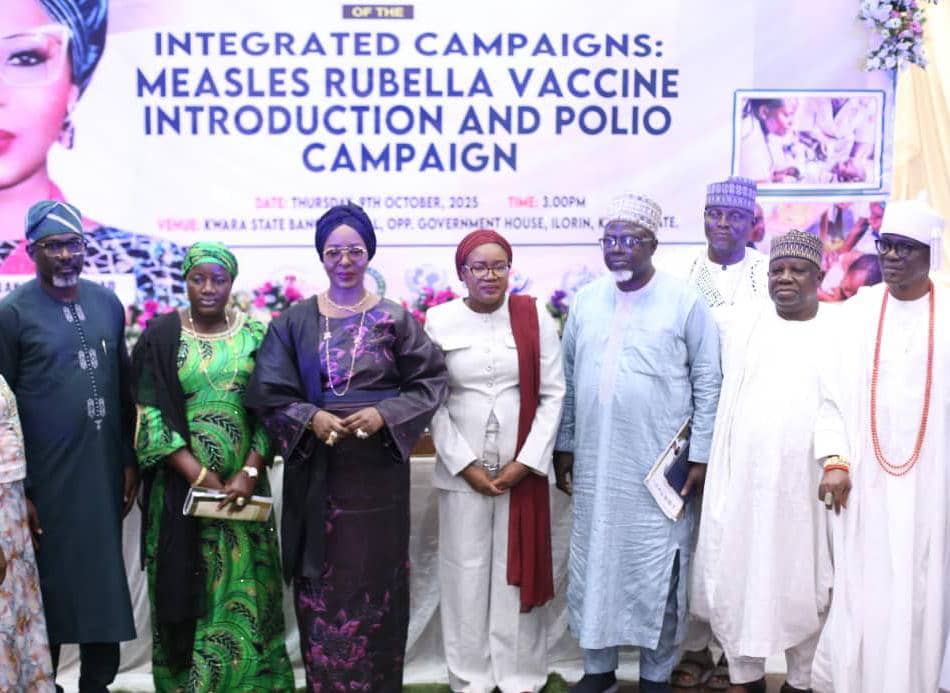
- First Lady says it’s life-saving initiative, urges active participation
Stephen Olufemi Oni, Ilorin
Kwara State Government has launched an integrated vaccination campaign to prevent Measles Rubella and Polio diseases among vulnerable groups in the state.
The exercise, which will last for 10 days – beginning from Saturday 11th October 2025 — is expected to cover at least 1.8 million children whose ages range between 9 months and 14 years (for Measles Rubella vaccine) and zero to 5 years for oral polio vaccine.
The programme was organised by the Kwara State Primary Healthcare Development Agency in collaboration with UNICEF and World Health Organisation (WHO), among other development partners.
At the flag off ceremony in Ilorin, the state capital, Kwara’s First Lady, Ambassador Prof. Olufolake AbdulRazaq, said the initiative is not just a policy milestone but a life-saving intervention for Kwara children and families.
She called on all parents and guardians to present their children within the age range for the vaccination.
“I commend the Kwara State Primary Healthcare Development Agency and all development partners for the efforts that culminated in the launch of the roll out of Measles Rubella Vaccine in the state,” First Lady Ambassador Olufolake AbdulRazaq said.
She said the introduction of the measles-rubella (MRV) vaccine is essential and timely, considering the outbreaks of measles in some parts of the country.
According to her, Nigeria now contends with a reality in which only about 60 percent of children receive the first dose of measles vaccine, while the second dose coverage is as low as 38 percent, noting that this coverage gap is responsible for the outbreaks.
By launching MRV, the country, Kwara inclusive, stands the chance of closing a long-standing gap towards protecting every child, mother, and family, she added.
The First Lady enjoined relevant stakeholders, including traditional and religious leaders, community heads, and the media, to complement government’s efforts in propagating the benefits of measles rubella and polio vaccines.
Commissioner for Health, Dr Amina Ahmed El-Imam, said the campaign is a transformative public health initiative to save lives across the communities.
El-Imam, who was represented by the Permanent Secretary, Ministry of Health, Dr Abdullahi Taoheed, urged all stakeholders to commit resources and attention to raising awareness, mobilising communities, and overcoming any logistical or cultural barriers to vaccination.
Executive Secretary, State Primary Healthcare Development Agency, Prof Nusirat Elelu, said the agency is deploying 8,657 trained personnel, including health workers, supervisors, and security personnel to carry out the campaign.
“Measles remains one of the most contagious and fatal viral diseases affecting young children globally, despite the availability of a safe and highly effective vaccine,” she said.
“Between years 2000 and 2023, it is estimated that measles vaccination alone averted over 60 million deaths globally. Yet, the disease remains endemic in many developing countries, particularly Africa and Asia.”
Prof Elelu said Rubella poses a serious risk to pregnant women, such as miscarriage, fetal death, or the birth of infants with Congenital Rubella Syndrome (CRS).
Assuring that the agency will not rest on its oars to safeguard the people’s health, Elelu said immunization, ante-natal and all non-complicated delivery are given free of charge across primary healthcare centres (PHCs) in the state.
The Executive Secretary commended Governor AbdulRazaq for his huge investments in the health sector, and his Deputy, Mr Kayode Alabi, who is the
Chairman of the State Task Force on Immunization and PHC, for the untiring support.
“We are extremely grateful to Her Excellency, Amb. (Prof.) Olufolake AbdulRazaq, whose relentless advocacy for maternal and child health has been a beacon of hope for our communities,” she added.
Dr. Adeola-Musa of the National Primary Healthcare Development Agency enjoined community leaders and parents to embrace the exercise by mobilising children for vaccination.
Surveillance Officer for World Health Organization (WHO), Mrs Abdulkadir Rashidat, said the vaccines are safe, effective and suitable to protect the children, calling on all parents and community leaders to accord the vaccination teams the needed support to function.
Ibrahim Tsado Mohammed, a Social and Behaviour Change Specialist at
UNICEF, warned that measles, rubella, and polio continue to pose significant health threats to children despite global progress.
He implored the media and civil society organisations to help counter misinformation in some quarters and reduce hesitancy surrounding the vaccination campaign.
Some of the dignitaries at the event were the Deputy Chief Whip, Kwara House of Assembly, Hon. Mariam Yusuf Aladi; Chairman House Committee on Health, Hon. Seun Oguniyi; Cabinet members; Acting Head of Service, Kwara State, Mrs Shittu Olufunke Mercy; Chairman, State Civil Service Commission, Hajia Habibat Yusuf; Permanent Secretaries; Emir of Shonga, Dr Haliru Yahaya; Olupako of Share, Oba Olawale Haruna Ilufemiloye; and Balogun Alanamu of Ilorin, Dr Usman Abubakar Jos, represented by Alhaji Bolaji Ibrahim Alanamu.
Others were wife of the State Chief Judge, Mrs Olufunke Adebara; spouses of Chairmen of the 16 Local Governments; and wife of the State APC Chairman, Princess Ayodele Fagbemi.
End
Health
World Sight Day 2025: FG Urge to Prioritize Eye Health as 1.3m Nigerians estimated to be blind

From our Correspondent
The Chairman, National Eye Health Committee, Prof Afekhide Ernest Omoti has stressed the need for individuals, communities, and governments to prioritize vision care as a vital part of overall health and national development.
The medical expert disclosed that findings revealed that 1.3 million Nigerians are estimated to be blind with over 80% of these cases being preventable or treatable.
Prof. Omoti who is a consultant ophthalmologist and also the Chairman, Eye Health Committee of the Nigerian Medical Association (NMA), made the call as part of activities to commemorate the 2025 World Sight Day with theme, “Love Your Eyes”, “Love Your Eyes at work”, “Love Your Eyes Kids”, “Love Your Eyes – Protect the Future,”.
Prof. Omoti stated that the World Sight Day 2025 is a global event dedicated to raising awareness about the importance of eye health and the prevention of avoidable blindness.
Prof. Omoti also noted that in Nigeria, millions of Nigerians suffer from visual impairment, and many are at risk due to preventable causes.
“As we celebrate today, let us remember that vision is not just about sight; it is also about connection, opportunity, and the ability to navigate the world. Our eyes allow us to experience the beauty of life and our environment, from the smiles of our loved ones to the vibrant culture that surrounds us.
“This year’s theme, “Love Your Eyes”, “Love Your Eyes at work”, “Love Your Eyes Kids”, “Love Your Eyes – Protect the Future,” calls each of us – individuals, communities, and governments to action. This is because when we protect our eyes, we are not just safeguarding sight; we are securing productivity, learning, inclusion, dignity, and the future of our nation.
He emphasizes the urgent need for individuals, communities, and governments to prioritize vision care as a vital part of overall health and national development.”he said.
Speaking on the significance of the day, Prof Afekhide Ernest Omoti, a consultant Ophthalmologist, past chairman of Edo NMA and Chairman of the Eye Health Committee called on the public to take proactive steps toward protecting their vision.
He noted that eye health is not a privilege or a luxury but a human right, which, according to him, is also a cornerstone of national development.
“When we invest in eye care, we reduce poverty, boost education, and empower individuals to live full, productive lives. Little wonder that many of the sustainable development goals depend on good vision.
According to him, every Nigerian deserves access to affordable and quality eye care.
Prof. Omoti, while urging all Nigerian citizens to get their eyes tested regularly and to seek care early, especially for children and the elderly said over 1 billion people worldwide live with vision loss that could have been prevented or treated.
“Estimates in 2020 suggest that 24 million people in Nigeria were living with some form of vision loss, many unnecessarily. An estimated 4.25 million adults aged 40 and above have moderate to severe visual impairment, 1.3 million Nigerians are estimated to be blind with over 80% of these cases being preventable or treatable.
“Cataracts, glaucoma, refractive errors, tropical diseases, and diabetic retinopathy continue to rob our people both young and old of their sight, their confidence, and their economic potential. We can not afford to ignore this any longer.” Omoti said.
Health
Milestone; Kwara LG Declared Open Defecation Free by FG

Stephen Olufemi Oni, Ilorin
The Federal Ministry of Water Resources and Sanitation has officially declared Oke-Ero Local Government Area (LGA) in Kwara State as Open Defecation Free (ODF), following a comprehensive validation exercise conducted by the National Task Group on Sanitation (NTGS).
The validation exercise was carried out between 21st and 25th July, 2025 by the NTGS, during which Oke-Ero LGA was assessed in accordance with the revised national ODF protocol. Based on the findings, the LGA was found to have met all required indicators and was therefore approved for ODF status on 27th August, 2025.
The official communication of this development was conveyed to Mr. Olorunfemi Adewumi Oladipo, the General Manager of the Kwara State Rural Water Supply and Sanitation Agency (RUWASSA), through a formal letter authored by the Director of Water Quality Control and Sanitation at the Federal Ministry; Mrs. Elizabeth Ugoh. The letter was issued on behalf of the Minister of Water Resources and Sanitation.
Mrs Elisabeth Ugoh, who congratulated the Kwara State Government and the people of Oke-Ero on achieving this national milestone, noted that sanitation is a continuous activity.
The correspondence described the achievement as a significant step forward in the national effort to eradicate open defecation and commended the sustained efforts of the local government, community leaders, stakeholders, and sanitation partners.
It would be recalled that the NTGS validation team conducted detailed assessments across households, institutions, and public spaces in Oke-Ero LGA, confirming the absence of open defecation and the presence of functional sanitation facilities, hygiene awareness, and sustained behavioural change, all of which are prerequisites under the national ODF criteria.
As part of the formal process, the Minister, Prof. Engr. Joseph Terlumun Utsev, is expected to communicate this achievement in writing to Governor AbdulRahman AbdulRazaqn, as, in line with established national protocol, the Governor is expected to host an official event to commemorate the ODF declaration of Oke-Ero LGA.
Reacting to the development, the Commissioner for Water Resources, Hon. Yinusa Lade, lauded the milestone as a testament to the state’s unwavering commitment to improving sanitation and public health. He commended the people of Oke-Ero for their resilience, cooperation, and ownership of the sanitation initiatives, which he described as critical to the sustainability of this achievement.
Hon. Lade, who reiterated the State government’s commitment to scaling up similar interventions across other LGAs, noted that with Oke-Ero setting the pace, the Ministry will intensify efforts to ensure that the entire State is declared Open Defecation Free well ahead of the national 2030 target.
Responding to the announcement, Mr. Oladipo expressed appreciation for the recognition, describing it as a reflection of collaborative effort across multiple levels of governance and community participation. Mr Olorunfemi Oladipo reaffirmed RUWASSA’s continued commitment to supporting other LGAs in the State to achieve similar results.
Mr Oladipo also urged local authorities and stakeholders in Oke-Ero to ensure the sustainability of this status, by adhering to the recommendations outlined in the validation report, which has been enclosed with the official communication.
This development positions Kwara State as one of the leaders in sanitation progress and contributes meaningfully to Nigeria’s broader objective of eliminating open defecation nationwide by 2030, in alignment with the Sustainable Development Goals (SDGs).
End
-

 Uncategorized5 years ago
Uncategorized5 years agoFG, states urged to harness flooding for ranching, others with technology – Agbaje
-

 Headlines10 years ago
Headlines10 years agoBreaking: EFCC seals Borno House of Assembly, as Hon members take to their heels
-

 News12 years ago
News12 years agoNigeria Security Operatives Stage Manhunt For Homosexual Perpetrator
-

 News9 years ago
News9 years agoHow 21-year-old Girl fled community over accusation of lesbianism
-

 News10 years ago
News10 years agoYobe Gov Moves Against Deputy
-

 Opinion7 years ago
Opinion7 years ago7 signs she has friend zoned you
-
Technology4 years ago
Online job placement company headhunts women
-

 Headlines10 years ago
Headlines10 years agoBorno Dep Gov Abducts Another Church Leader

